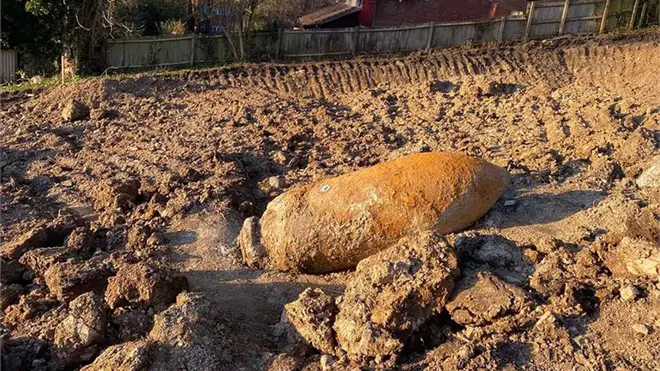
Nick Abbot 10pm - 1am
27 February 2021, 13:46 | Updated: 28 February 2021, 09:29

Unexploded WWII bomb in Exeter detonated
Structural damage has been caused to a number of properties in Exeter following the detonation of a Second World War bomb, police said.
The device, believed to be a 1,000kg "Hermann" bomb used by the Nazis, was discovered on a building site on private land to the west of the University of Exeter campus on Friday morning.
Initially, a 100-metre cordon was erected, but this was extended to 400 metres on Saturday at the request of the Royal Navy bomb disposal team.
Residents at around 2,600 properties in the vicinity of Glenthorne Road, including 1,400 university students, were evacuated on Friday and Saturday.
The controlled detonation of the device took place at 6.10pm on Saturday, with the explosion heard for miles.
To mitigate the impact of the blast, around 400 tonnes of sand was transported to the site and walls were erected by the Royal Navy bomb disposal experts and Army personnel from the Royal Logistics Corps.
Police warned that a "loud bang" was expected when the bomb was detonated but said there was no cause for alarm as the cordon meant there were no health risks to anyone beyond its perimeter.

A spokesman for Devon and Cornwall Police said: "However, unfortunately structural damage has been caused to some buildings, primarily within the 100-metre cordon, including blown-out windows and cracks in brickwork.
"Every effort is being made this morning to ensure structural assessments are conducted as soon as possible so that residents can return home later today."
Police are working with agencies, including Devon County Council, Exeter City Council and utility companies, in the hope that residents will be able to return home today.
The force spokesman added that residents should not return until further notice.
On Saturday, police said the impact of the blast had been "significant", with debris thrown at least 250 metres away and a crater around the size of a double decker bus.
There are no concerns regarding the impact of the explosion, which caused a large plume of sand, on public health grounds, the force confirmed.
It had previously been expected that residents, the majority of whom are staying with friends and family, would be able to return home on Saturday.
Devon County Council confirmed that visiting friends and family was allowed in such circumstances, despite Covid-19 restrictions.
Exeter University asked students not to return to their residences on Saturday to allow safety assessments to be conducted.
Nearby students who have had their work disrupted have been told they can apply for mitigation to avoid any damage to their grades due to the incident.
If you have been affected by this incident and need to apply for mitigation for any forthcoming assessments, please remember you can do so without the need to provide evidence.
— University of Exeter (@UniofExeter) February 27, 2021
We will update you further tomorrow.
One student, Fran Henderson, 18, was told to pack at 7pm on Friday before being taken to a hotel outside of Exeter at 1am on Saturday.
The politics, philosophy and economics student told the PA news agency that she had been informed it was "most likely" that she would be able to return to her student residence at 12pm on Sunday.
"The site is about 120 metres away from our accommodation," Ms Henderson said.